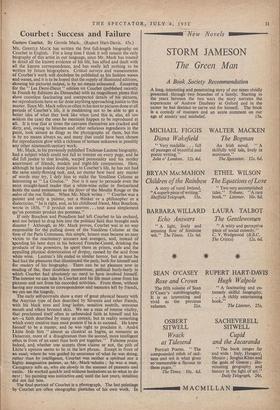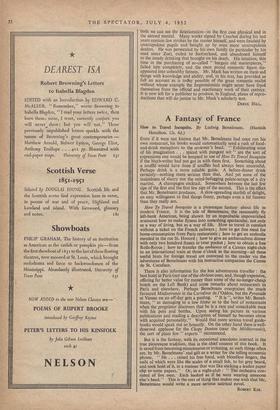Courbet : Success and Failure
Gustave Courbet. By Gerstle Mack. (Rupert Hart-Davis. 45s.) MR. GERSTLB MACK has written the first full-length biography on Courbet in English. For a long time I think it will remain the only biography of this artist in our language, since Mr. Mack has treated in detail all the known evidence of his life, has sifted and dealt with all the known correspondence, and has really left nothing to be written by future biographers. Critical surveys and reassessments of Courbet's work will doubtless be published as his fashion waxes and wanes, and it is to be hoped that the supply of illustrated editions, showing his pictorial output,- is by no means exhausted. Excepting for the " Les Demi-Dieux " edition on Courbet (published recently in French by Editions du Dimanche) with its magnificent plates that show countless fascinating and unexpected details of his pictures, no reproductions have so far done anything approaching justice to this master. Since Mr. Mack refers so often in his text to pictures done at all periods of Courbet's life, it is maddening not to be able to get a better idea of what they look like when (and this is, alas, all too seldom the case) the ones he mentions happen to be reproduced at all. It is true that at times the canvases themselves are cracked and dirty, and, owing to bitumen and other nefarious ingredients in the paint, look almost as dingy as the photographs of them, but this is by no means always so, and many that could have been chosen for reproduction glow with a richness of texture unknown in possibly any other nineteenth-century work.
Mr. Mack, in his previously published Toulouse-Lautrec biography, had a subject which could not fail to interest on every page, and he did full justice to that lovable, warped personality and his motley assortment of friends, models and night-life companions. Here, although he has indeed done justice to Courbet's life, he has not had the same easily-flowing task, and, no matter how hard any master of words may try, I defy him to make' the Vendome Column as interesting as " La Goulue." Nor is it easy to persuade even the most straight-laced reader that a white-wine cellar in Switzerland holds the same enticement as the foyer of the Moulin Rouge or the salon of the rue Tellier. When Mr. Mack writes : " Courbet was a painter and only a painter, not a thinker or a philosopher or a dialectician," he is right, and, as his childhood friend, Max Bouchon, wrote in 1856, " it produit ses oeuvres ... tout aussi simplement qu'un pommier produit des pommes."
If only Bouchon and Proudhon had left Courbet to his orchard, and not helped to drag him into the political field that brought such disaster ! Although, as Mr. Mack proves, Courbet was in no way responsible for the pulling down of the Vendome Column at the time of the Paris Commune, this simple, honest man became an easy victim to the reactionary accusers and avengers, and, instead of spending his later days in his beloved Franche-Comte, drinking the products of his pommiers, he spent them in prison, exile and the appalling physical deterioration of dropsy, caused by the acid from white wine. Lautrec's life ended in similar horror, but at least he had had the pleasures that illuminated the path, both for himself and for readers of his biography. There can be no pleasure now in reading of the, then doubtless momentous, political hurly-burly in which Courbet had absolutely no need to have involved himself. The interest we can take in Courbet and his life must come from his pictures and not from his recorded activities. From these, without having any recourse to correspondence and‘memoirs left by friends, we can see the tragedy.
The early self-portraits show a man of great physical beauty with the Assyrian type of face described by Silvestre and other friends, with his black eyes and long- lashes, sensitive nostrils, sensuous mouth and silken bronzed skin. We see a man of intense vitality, that proclaimed itself often in unbounded faith in himself and his art—a faith described by many as conceit, but in reality something which every creative man must possess if he is to succeed. He knew himself to be a master, and he was right to proclaim it. Andre Lhote finds him " almost as classical as Ingres, as romantic as Delacroix, more of a draughtsman than the second, more intelligent often in front of an easel than both put together." Fulsome praise indeed, and, whether one accepts these claims or not, the pith of Lhote's opinion seems to lie in the last phrase. Except in front of an easel, where he was guided by assurance of what he was doing, rather than by intelligence, Courbet was neither a spiritual nor a highly imaginative painter, as Mr. Mack -admits ; he was a man, Castagnary tells us, who ate slowly in the manner of peasants and cattle. He worked quickly and without hesitations as to what to do next ; his painting was instinctive and, until the last years, intuition did not fail him.
The final portrait of Courbet is-a photograph. The last paintings by Courbet are often oleographic Pastiches of his own work. In both we can see the deterioration—in the first case physical and in the second mental. Many works signed by Courbet during his last years contain few strokes by the master himself, and were finished by unscrupulous pupils and bought up by even more unscrupulous dealers. He was persecuted by his own family (in particular by his mad sister Zoe), exiled to Switzerland, and abandoned himself to the steady drinking that brought on his death. His intuition, this time in the purchasing of so-called " bargain old masterpieces," failed him completely, and the once proud romantic figure, dis- appeared into unhealthy fatness. Mr. Mack has written on these sad things with knowledge and ability, and, in his text, has provided as full an account as is today possible of the great romantic realist without whose example the Impressionists might never have freed themselves from the official and reactionary work of their century. It is now left for a publisher to produce, in England, plates of repro- ductions that will do justice to Mr. Mack's scholarly text.
DEREK HILL.



























































 Previous page
Previous page